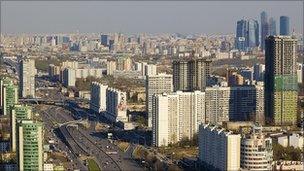Bribes and desire to show off push up Moscow prices
- Published

To find a Moscow coffee place with London prices could be difficult
When visiting Moscow from London, not the cheapest city itself, the price of a cappuccino can be an unpleasant surprise.
Prices of 200 roubles ($7.20; £4.40) and above are not unusual in many places in central Moscow and sometimes even in the outskirts of the city.
Coffee is just one of many services and goods that are expensive in the Russian capital.
Ulyana Lenvalskaya, consumer goods, retail and agriculture analyst at Renaissance Capital in Moscow, says there are two main reasons.
Moscow, as well as St Petersburg, is a specific market, she says, as there is a small social stratum of people living there who "like to show off" and are ready to pay extra for what they see as status.
Besides, says Ms Lenvalskaya, commercial property to rent is expensive in the centre of Moscow, which adds to the price of shopping, eating or drinking there.
Property factor
The European University in St Petersburg estimates housing and commercial property prices could be up to 60% lower in Moscow but for ineffective bureaucracy and corruption.
Speaking of the rest of Russia, the university says defective institutions are responsible for up to 30% of property prices, 15% of the cost of retail goods and 10% of communication services prices.
The report, released earlier this year, highlights bureaucracy, bribes and "legalised corruption".

Moscow property prices could be much lower, researchers say
Another factor pushing prices higher is short-term planning due to general unpredictability regarding a firm's future and its ownership rights.
It leads to businesses trying to cut payback periods and, as a result, increasing prices, the report says.
The European University experts say significant losses from defective institutions arise when an entrepreneur has to deal with property issues, ranging from building a property to renting one.
Country specifics
The Doing Business Project, measuring business regulations and their enforcement across 183 economies, ranks Russia 123rd, behind China (79th), but roughly at the same level as two other major emerging economies - Brazil (127th) and India (134th).
But in terms of "dealing with construction permits" Russia is ranked 182nd, or second to last.
Brazil, Russia's fellow energy-dependent Bric state, stands 112th when it comes to dealing with construction permits.
Brazil is also doing much better than Russia in terms of fighting corruption, according to the anti-corruption organisation Transparency International. It is ranked 69th in in the group's corruption perceptions index, compared with Russia's 154th place.
But there are some other specific factors affecting consumer prices in Brazil.
"One significant driver is the presence of automatic price-adjustment mechanisms within the Brazilian economy, which are a legacy of Brazil's past struggles with hyperinflation," says Lloyd Barton, macro-forecasting team senior economist at Oxford Economics Ltd.
For example, he says, a third of the country's benchmark price index consists of government-controlled prices, which are often set with reference to past inflation.
Besides, the minimum wage, public sector wages and pensions are increased each year based on the previous year's inflation and the economy's growth from two years beforehand.
"These policies impart significant momentum to consumer prices, so when inflation rises it becomes hard to bring back down," says Mr Barton.
Pricing chain
Apart from ineffective bureaucracy, corruption and the status factor, there is a number of more or less objective reasons for some prices being higher than in other countries.
"For example, bananas do not grow in Russia and they will not start growing here," says Ms Lenvalskaya.
"As a result, you get two links, distributors and retailers, instead of just the retailers link in the pricing chain."
But, the analyst says, bigger retailers have recently started importing goods themselves, squeezing the distributors link out.
These steps, combined with the Russian government's declared aim of fighting corruption and increasing the effectiveness of the economy, could one day lead to fairer consumer prices.
Now, you can still find Moscow coffee shops and restaurants where nice coffee costs "only" as much as in London.
But you really need to know where exactly to go.